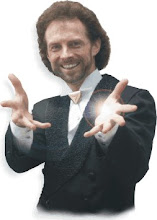Levels of Character
The first is the external or more superficial aspects of your character, and the second is the internal or more personal aspects of your character. The external character you could think of as a "classification" of who you are. And the internal character has more to do with your own unique personality traits. The external aspects of your character have to do with things like race, gender, nationality, social status, etc., etc. But the internal aspects have more to do with your emotional range and how you express yourself.
For example, Shimada could be classified as a "samurai magician". That's the external description. But it's his power, presence and charisma that brought that character to life and made it captivating and dynamic.
A cowboy might be an external description of a character, but Clint Eastwood and Jim Carrey could both play cowboys in a movie, and yet how they played those roles would be vastly different. Many performers in magic give thought to developing a character, but they often stop with mainly the external character traits and never go much deeper than that. But it is those internal, distinct personality traits that will allow you to express more of your unique individuality and make you more appealing and interesting as a character, and in turn make your magic much more than just a few cool tricks.
Actors understand this. We should definitely take a page from their book! It's one of the keys to making magic a true performing art.

